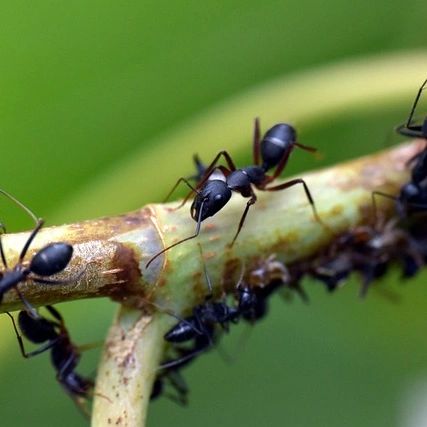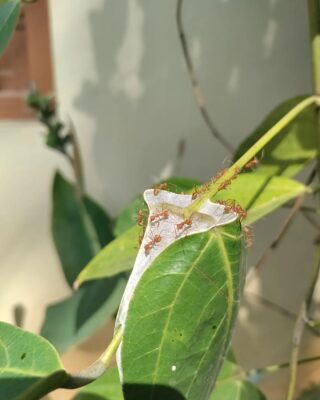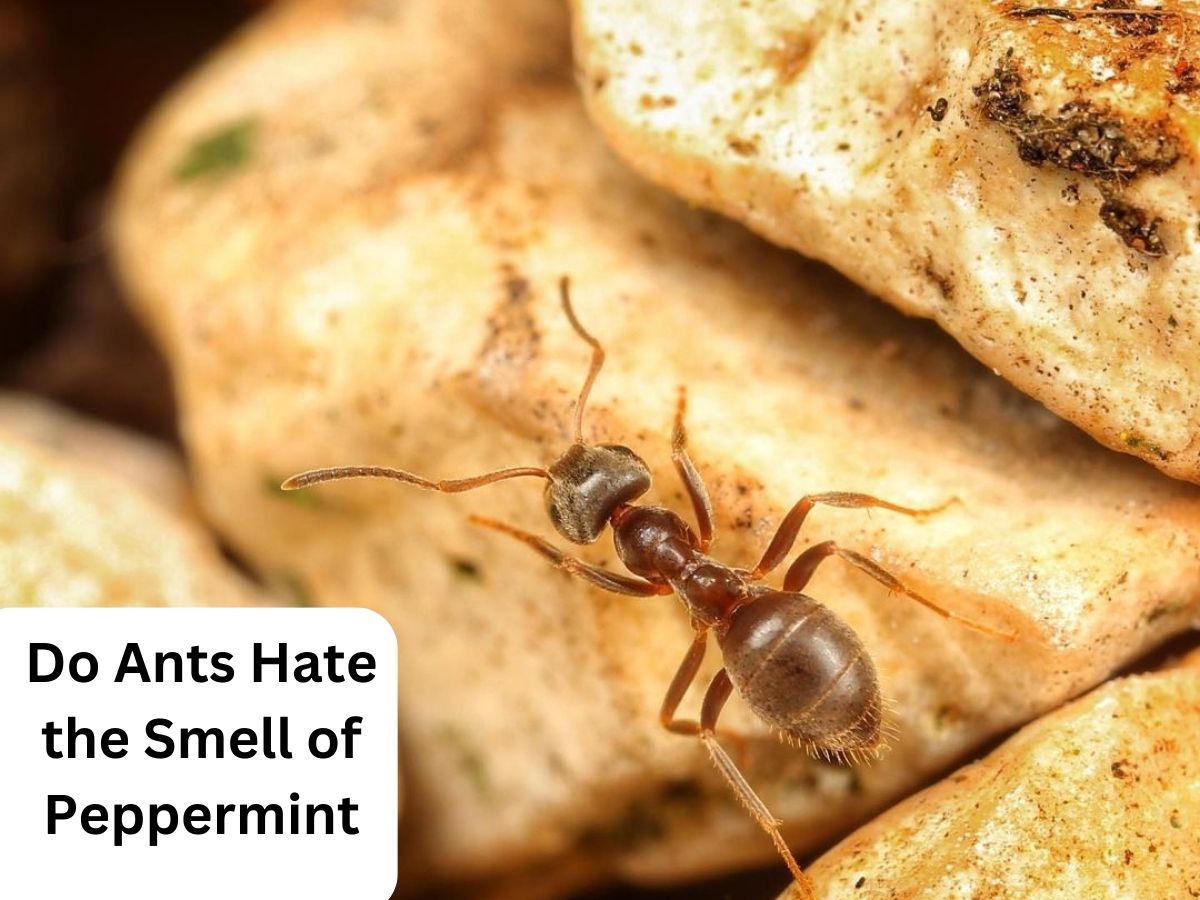Curious minds want to know: Do ants hate the smell of peppermint? It’s not just an idle question – it’s a quest for a natural, aromatic solution to keep those pesky critters at bay. Picture this: You’re sipping a cup of peppermint tea on your porch, enjoying the refreshing scent wafting through the air. Little do you know, this very aroma might hold the key to deterring ants from infiltrating your space.
Ants are industrious creatures, but they can quickly turn from fascinating to frustrating when they invade our homes, picnics, and gardens. The idea that peppermint, a beloved herb known for its invigorating fragrance, could be an ant-repelling powerhouse is both intriguing and, frankly, a bit too good to be true. But let’s not jump to conclusions just yet.
In the world of natural pest control, peppermint has gained popularity as a potential repellent. The notion is simple: ants rely heavily on their sense of smell for communication and navigation. Could the potent aroma of peppermint oil be the disruption ants need to steer clear of our spaces? If this were the case, it would be a win-win – we get to enjoy the refreshing scent, and ants stay out of our way.
However, as with any DIY solution, the devil is in the details. Does the smell of peppermint truly send ants running in the opposite direction, or is it a myth that’s gotten a bit out of hand?
In this article, we’re diving deep into the world of ant behavior, scent perception, and the science behind peppermint’s aroma. So, grab a seat, and let’s uncover whether ants truly hate the smell of peppermint or if it’s all just a fragrant fable.
Ant’s Sense of Smell and Behavior
Prepare to be amazed by the intricate world of ants, where scent is king and communication is a complex dance of odors. These tiny insects might not have vocal cords, but they’ve mastered the art of olfactory communication – and it’s a fascinating spectacle to behold.
Imagine living in a world where smells hold the power to guide you garden, lead you to a treasure trove of food, and help you identify friends from foes. For ants, this is their reality. Their sense of smell isn’t just a handy tool; it’s a fundamental aspect of their existence. Whether it’s finding food, marking trails, or alerting their colony about potential dangers, scent is their go-to medium.
At the heart of their aromatic universe are pheromones – chemical messengers that ants produce and release to convey messages. These pheromones are the language of ants, communicating a wide array of information, from the discovery of food sources to the need for reinforcements in times of crisis. It’s like a sophisticated network of invisible Post-it notes, guiding ants to act in harmony.\

Now, here’s where it gets interesting. Imagine you’re an ant happily strolling along a pheromone-laden trail, following your comrades toward a promising food source. Suddenly, a powerful scent, like that of peppermint, hits your antennae. It’s overwhelming, disrupting the carefully laid pheromone trail that once guided you. Confusion ensues. You’re no longer sure which way to go. This scenario illustrates how certain smells can serve as a roadblock in ant communication.
So, while ants’ sense of smell is an incredible asset, it can also be their Achilles’ heel. A potent smell, like that of peppermint, has the potential to throw a wrench in their well-choreographed activities. It’s like changing the radio station in the middle of a dance routine – things get a bit chaotic.
In the next section, we’ll dive into the specifics of peppermint’s scent and how it might just be the disruptor we need to keep ants at bay. But before we do that, take a moment to marvel at the intricate world of ant olfaction, where scents are signals and pheromones are the architects of their society.
Peppermint: A Natural Repellent
Peppermint – it’s not just a favorite flavor for candies and teas; it’s also emerging as a potential hero in the realm of natural pest control. But before diving into the nitty-gritty of its ant-repelling abilities, let’s take a journey back in time and explore the historical roots of peppermint and other essential oils to keep insects at bay.
Long before chemical sprays and high-tech solutions, our ancestors turned to nature’s bounty for answers. Essential oils, extracted from plants like peppermint, were valued for their versatile properties. Ancient civilizations, from Egypt to Greece, harnessed the power of these oils to repel pests, soothe ailments, and even as offerings in religious ceremonies.
Peppermint, with its invigorating aroma, has stood the test of time as a versatile remedy. It’s not just about the scent; it’s about the compounds within peppermint oil that make it a potentially effective insect repellent. Two key players in this aromatic symphony are menthol and menthone.

Menthol is responsible for that cool, refreshing sensation you experience when you apply peppermint oil. But for insects, it’s more like an unwelcome frost. This compound can be overpowering to their sensitive olfactory systems, causing them to reconsider their presence in the vicinity. Menthone, another prominent compound, adds to the olfactory overload, creating an environment that ants might find less inviting.
But here’s the beauty of it all: while humans find the scent of peppermint energizing and delightful, ants – those creatures guided by their delicate senses – might find it overwhelming. Imagine walking into a room filled with a scent so strong that it distracts you from your mission. That’s the kind of disruption peppermint might be causing in the ant world.
So, in essence, peppermint isn’t just a pretty aroma; it’s a cocktail of compounds that could potentially be the answer to our ant-related woes. In the next section, we’ll explore the science behind ants’ reaction to peppermint and whether this natural remedy holds up under scrutiny. But before we do that, take a moment to appreciate the wisdom of the ancients who, generations ago, uncovered the secrets of these aromatic oils and their powerful effects on the world around us.
Ant Damage in the Garden
Ants might seem harmless, but their presence in the garden can actually cause a range of issues that can negatively impact your plants and outdoor space. Here’s a glimpse into the potential damage caused by ants in the garden:
- Plant Damage: Certain ant species, like the voracious aphid-tending ants, “farm” and protect aphids, which are tiny insects that feed on plants by sucking out their sap. This symbiotic relationship between ants and aphids can lead to weakened and damaged plants.
- Soil Disruption: Ant colonies can create intricate tunnel systems beneath the soil surface, disrupting the soil structure. This can hinder water infiltration and root growth, affecting the overall health of your plants.
- Seedling Destruction: Ants are known to carry away seeds, especially small ones before they have a chance to germinate. This can reduce your plant’s chances of successful reproduction.
- Nesting in Pots: Ants often establish nests in potted plants. While they might not directly harm the plants, their activity can disturb the soil, potentially leading to root damage and reduced plant vigor.
- Unwanted Visitors: Ants can also attract other pests like aphids, scavenging insects and rodents, further complicating your garden’s ecosystem.
- Disrupted Harvest: In fruit and vegetable gardens, ants might be drawn to ripe produce, causing aesthetic damage or even making the produce less appealing for human consumption.
To address these potential issues, it’s important to manage ant populations in your garden. While natural solutions like peppermint oil might help deter ants, consider exploring integrated pest management strategies that address the root causes of ant presence while minimizing harm to beneficial insects and your garden environment.
Can Ants Smell Peppermint?
Ah, the million-dollar question: Can ants detect the scent of peppermint amidst the countless aromas that surround them? The answer lies within the intricate workings of ants’ olfactory systems and the insights gleaned from scientific studies.
Ants, it turns out, are quite the scent aficionados. Their antennae are equipped with specialized receptors that allow them to detect a wide range of odors, including the volatile compounds present in essential oils like peppermint. These receptors are like tiny gatekeepers, analyzing the chemical composition of the scents they encounter.
Numerous scientific studies have set out to uncover ants’ reactions to peppermint oil. Some research suggests that the strong aroma of peppermint can indeed disrupt ants’ pheromone trails and communication. Think of it as a game of sensory overload – the powerful scent of peppermint becomes a distracting force that throws off ants’ finely tuned navigation systems.

However, as with any scientific exploration, there are shades of gray to consider. While some studies support the notion that ants dislike the scent of peppermint, conflicting research has emerged as well. Ant species vary in their sensitivity to scents, and environmental factors play a role too. It’s like asking a group of people if they like a certain perfume – you’re bound to get a range of opinions.
So, can ants smell peppermint? The answer is a resounding “yes.” Their olfactory systems are finely tuned, and they can perceive the aromatic compounds present in peppermint oil. But whether they hate it enough to flee in the opposite direction isn’t always a straightforward conclusion.
In the realm of pest control, it’s crucial to recognize that no one scent fits all. While peppermint might be a potent repellent for some ant species, it might not have the same impact on others. And that’s the beauty of scientific exploration – it keeps us questioning, discovering, and refining our understanding.
In the next section, we’ll roll up our sleeves and get practical. We’ll explore how you can put this peppermint knowledge to use in your battle against ant invasions. But before we dive into the DIY strategies, take a moment to appreciate the complexity of ants’ olfactory world, where scents shape their behaviors in ways both predictable and intriguing.
Can I use peppermint essential oil directly on ant trails?
Absolutely, you can use peppermint essential oil directly on ant trails, but with a touch of caution and a splash of dilution. While peppermint oil can be a powerful ant deterrent, using it undiluted might be a bit overwhelming for the tiny insects – not to mention potentially wasteful.
To create your DIY ant-repelling potion, mix a few drops of peppermint essential oil with water. A general guideline is about 10 to 15 drops of peppermint oil per cup of water. Mix it thoroughly to ensure proper dispersion of the oil.
Remember, ants are sensitive creatures, and the goal is to deter them without overwhelming their senses. By diluting the peppermint oil, you strike the right balance between effective repellency and not creating a scent that’s too overpowering.
If you notice that ants are undeterred by the diluted peppermint solution, you can adjust the concentration by adding more or fewer drops of essential oil. Experimentation is key – just like fine-tuning a recipe until it’s just right.
So go ahead, unleash the power of peppermint on those pesky ant trails, and watch as your DIY potion creates a fragrant force field that’s decidedly unwelcome to these tiny invaders. And if you’re looking to amplify your natural pest control strategy, remember that peppermint can also play well with other natural repellents like vinegar, lemon, and cinnamon.
DIY Peppermint Repellent Strategies
Ready to put that bottle of peppermint oil to good use? Here are some practical and creative strategies to harness the power of peppermint and keep those ants at bay.

Creating a Peppermint Oil Spray:
Grab a spray bottle and prepare to concoct your very own ant-repelling potion. Mix a few drops of peppermint essential oil with water – about 10 to 15 drops per cup of water should do the trick. Shake well to blend the solution.
Now, simply spritz the mixture in areas where ants tend to frequent – think windowsills, doorways, and any nooks and crannies they might use as entry points. The potent scent will serve as a fragrant barrier, making your space a no-go zone for ants.
Placing Peppermint-Soaked Cotton Balls:
This strategy is both simple and charmingly effective. Soak cotton balls in diluted peppermint oil – the same mixture you used for the spray. Then, strategically place these peppermint-soaked cotton balls in areas where ants often make their appearances.
Under sinks, near windows, and along ant trails are all prime spots. As the scent diffuses from the cotton balls, ants might just think twice before venturing further.
Planting Peppermint Near Entry Points:
Why not tackle the ant invasion right at its source? Planting peppermint around your home’s entry points and garden can serve as a proactive defense against these tiny intruders. Peppermint’s vibrant leaves not only emit their signature aroma but also create a physical barrier that ants might be hesitant to cross. Plus, you’ll have a fresh source of peppermint for your DIY repellents – talk about a win-win!
Remember, consistency is key. Peppermint’s scent might be strong initially, but it can fade over time. Reapply your chosen peppermint remedy every few days or after rain to maintain its effectiveness. Also, be mindful of pets and kids – while peppermint is a natural solution, essential oils should be used with caution around them.
While peppermint-based strategies can be powerful, keep in mind that they might not work equally well for all ant species. Some ants might be more deterred by the scent than others. So, don’t be discouraged if you encounter a stubborn troop of ants – it might simply be time to explore other natural repellents or tailor your approach.
In the next section, we’ll delve into the real-life experiences of homeowners who’ve embraced the peppermint solution. Their stories might just inspire your creative approach to ant control. But first, gather your materials, mix up that peppermint spray, and get ready to take your pest control game to aromatic heights.
How often should I reapply peppermint oil?
Consistency is key when it comes to using peppermint oil as an ant repellent. While the strong scent of peppermint can be effective in deterring ants, it’s important to remember that essential oils, including peppermint oil, can evaporate over time, gradually diminishing their potency.
As a general guideline, it’s advisable to reapply your peppermint oil-based repellent every few days. However, factors such as the environment, temperature, and the level of ant activity in your area can influence how frequently you need to reapply.
Here are a few scenarios to consider:
- Rainy Weather: If your area experiences rainfall, the water can dilute the peppermint oil and reduce its effectiveness. In such cases, you might need to reapply more often, perhaps immediately after a rainy day.
- High Ant Activity: If you’re dealing with a particularly persistent ant invasion, you might want to reapply the peppermint oil every one to two days to ensure that the scent remains strong and discouraging.
- Indoor vs. Outdoor: The frequency of reapplication might also differ between indoor and outdoor areas. Outdoor areas might require more frequent application due to exposure to the elements.
- Cleaning and Sweeping: Regular cleaning and sweeping can also remove the peppermint oil from surfaces. If you’re diligent with cleaning, you might find it necessary to reapply more often.
- Personal Observations: Keep an eye on ant activity and observe whether they are avoiding the treated areas. If you notice ants returning or the scent fading, it’s a cue to refresh your repellent.
In essence, your best guide is your observation. If you notice that ants are becoming bolder or if the scent of peppermint is diminishing, it’s time for a refresh. Be proactive, and remember that maintaining a consistent presence of the peppermint scent is essential to its success in deterring ants.
By staying vigilant and responsive to the conditions in your environment, you can fine-tune your reapplication schedule to keep those ants at bay and maintain the fragrant barrier you’ve established.

Are there any safety concerns with using peppermint oil?
While peppermint oil can be a potent and natural solution for repelling ants, it’s important to handle it with care, especially if you have pets, children, or sensitive skin. Peppermint oil is concentrated and can cause skin irritation or adverse reactions if not used properly. Here are some safety considerations to keep in mind:
- Dilution: Always dilute peppermint oil before using it as a repellent. Mixing a few drops of peppermint oil with water or a carrier oil, such as coconut oil or jojoba oil, helps to reduce its intensity and the risk of irritation.
- Patch Test: Before applying any peppermint oil mixture to a larger area, perform a patch test on a small and discreet part of your skin. This helps you determine if you have any allergic reactions or skin sensitivities to the oil.
- Children and Pets: Peppermint oil’s strong aroma can be overwhelming for children and pets. Keep essential oil solutions out of reach, and avoid applying them in areas where your little ones or furry friends spend a lot of time.
- Ventilation: When using peppermint oil indoors, ensure proper ventilation. The aroma can be quite potent, and good airflow helps prevent the scent from becoming too overpowering.
- Avoid Eyes and Sensitive Areas: Be cautious when applying peppermint oil near the eyes, nose, and other sensitive areas. Direct contact with these areas can cause discomfort.
- Use as Directed: Follow the instructions for application and dilution provided earlier in this article. Applying too much-undiluted oil can lead to skin irritation.
- Consult a Professional: If you have allergies, respiratory issues, or concerns about using essential oils, consider consulting a healthcare professional before using peppermint oil or any other essential oil.
Remember, while peppermint oil can be a natural and effective solution, safety should always be a priority. By handling it responsibly and taking necessary precautions, you can enjoy the benefits of peppermint oil’s scent without any unwanted side effects or irritations.
Other Natural Ant Repellents
Peppermint might be the star of the show, but the world of natural ant repellents is rich with alternatives that can work in harmony or even amplify its effects. If you’re ready to expand your pest control arsenal, consider these nature-approved options:
- Vinegar: The pungent aroma of vinegar can be a potent deterrent for ants. Mix equal parts of vinegar and water in a spray bottle, and target ant-prone areas with your homemade solution.
- Lemon: Citrusy and refreshing, lemon’s scent is delightful to humans but less so to ants. Simply squeeze some lemon juice or rub lemon peels along ant trails and entry points.
- Cinnamon: This beloved spice isn’t just for baking – ants seem to have an aversion to its scent. Sprinkle cinnamon powder near ant hotspots or use cinnamon sticks as a natural barrier.
- Bay Leaves: The aromatic compounds in bay leaves can be ant-repellent wonders. Place bay leaves near entrances and potential ant access points.
- Pepper: Whether black, cayenne, or chili pepper, the heat in these spices can discourage ants. Sprinkle a bit of pepper in their paths or infested areas.
- Essential Oil Blends: Get creative by blending different essential oils with complementary scents. Mixtures like peppermint and eucalyptus or lavender and tea tree can create a multi-layered repellent effect.
Now, here’s the exciting part: Every home or garden and situation is unique. Just as ants have diverse species and behaviors, your living space has its layout and characteristics. This is where experimentation comes into play. What works wonders for one household might be less effective for another.
Don’t hesitate to mix and match these natural repellents to discover your winning combination. A sprinkle of cinnamon here, a splash of vinegar there – it’s all about finding the balance that ants simply can’t stand. Keep in mind that patience is key; it might take a bit of trial and error to uncover the magic formula that keeps your space ant-free.
So, embrace your inner scientist and embark on a journey of discovery. The world of natural repellents is your playground, and as you tinker with scents, you’re not just combating ants – you’re also exploring the diverse aromas nature has to offer.
Conclusion
And there you have it – a journey through the aromatic world of ants and peppermint. We’ve explored the fascinating realm of ants’ olfactory prowess, delved into the science behind peppermint’s potential as a natural repellent, and navigated the art of DIY pest control with peppermint-infused solutions. From sprays to soaked cotton balls, we’ve uncovered strategies that allow us to coexist with ants while keeping them at a respectful distance.
But in this fragrant tale, it’s important to remember that nature’s solutions aren’t one-size-fits-all. Ant species vary, environments differ, and what works marvelously for one might be less effective for another.
As you embark on your journey to create an ant-free haven, don’t hesitate to experiment, blend scents, and adapt strategies. It’s through this process of trial and discovery that you’ll find your sweet spot – a harmonious balance between nature’s aromas and ants’ preferences.
Peppermint, with its invigorating scent and potential ant-repelling properties, offers a promising avenue for those seeking natural remedies. And as we bid farewell, armed with peppermint oil and a newfound appreciation for ants’ sense of smell, let’s remember that even in our quest for a pest-free environment, nature has its rhythm.
So, whether you’re chasing away ants, delighting in peppermint’s fragrance, or simply relishing the aromatic symphony of life, may your journey be as refreshing as a sip of peppermint tea on a summer’s day.
